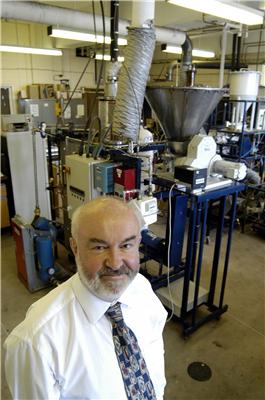Oct 29 2009
Aston University in Birmingham, UK is involved in a € 3.73m (£3.4 million) research project, which will transform organic residues from biofuel production processes into a renewable biofuel that can reduce reliance on fossil diesel imports.
 Professor Tony Bridgwater, Aston University
Professor Tony Bridgwater, Aston University
A particular benefit of the research is that the project will focus on utilising residues that do not require dedicated land, and thus avoid any 'fuel versus food' conflicts.
Aston's Bioenergy Research Group (BERG) has secured € 736,000 (£670,000) towards its role in DIBANET (Development of Integrated Biomass Approaches Network), which aims to produce a sustainable diesel miscible biofuel (DMB) for use in Europe and Latin America.
Increasingly, both regions are relying on imported fossil fuel for diesel car engines, and similarly are experiencing growing amounts of waste sent to landfill. It will help Europe to sustainably meet its 10 per cent biofuels quotient mandate outlined in EU Directives, for 2020.
The 42 month project, coordinated by the University of Limerick in Ireland, includes partners from Europe (Denmark, Greece, Hungary, Ireland and UK) and South America (Brazil, Argentina and Chile).
Professor Tony Bridgwater, who will be leading the project at Aston, said; "We want to create a sustainable biofuel, which meets industry regulations, is capable of being mixed with fossil diesel and can be used in a regular diesel engine.
"First generation biofuels made from foodstuffs such as sugar, corn and wheat have low yields and compete with traditional food.
"This project is based on second generation products from whole biomass with higher yields and which do not compete with food. In particular we will be processing the residues from these processes which will further improve performance and minimise waste disposal.
"We want to bring together a global network of experts and researchers, who are able to build upon existing biofuel technologies. This will help to pave the way for large scale biofuel production by 2020, in a way that doesn't impact on land usage and similarly helps solves the problems of growing amounts of organic waste."
The scheme is set to strengthen research collaboration between Europe and Latin America, with a Scholarship Scheme enabling PhD and post doctoral researchers to undertake biofuel production. A series of public lectures and presentations are also planned to engage the general public with the DIBANET scheme.